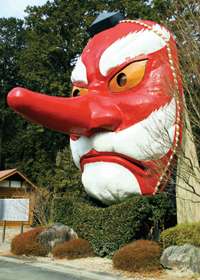天狗
Japanese
| Kanji in this term | |
|---|---|
| 天 | 狗 |
| てん Grade: 1 |
く > ぐ Hyōgaiji |
| on’yomi | |
Etymology
From Middle Chinese 天狗 (MC tʰen kəuX, “heaven + dog”). First appears in the Nihon Shoki (720 CE).
The Chinese version of tengu (Tiangou) was originally more of a dog-like spirit or falling star. As the term and idea were imported into Japanese, the character became associated with 修験道 (“Shugendō, a kind of syncretism of Buddhist and native Japanese elements”), and the Japanese tengu changed to resemble either a long-nosed 山伏 (yamabushi, “mountain monk”, a practitioner of Shugendō) with bright-red skin, or a crow.[1]
Noun
天狗 (hiragana てんぐ, rōmaji tengu)
- (Japanese mythology, Shinto, folklore) a tengu, a mythical Japanese creature, typically birdlike and having a long nose
-
- 様々なことを知っている天狗。神通力が使えるという。
- Samazama na koto o shitte iru tengu. Jintsūriki ga tsukaeru to iu.
- An omniscient tengu. They say it uses divine power.
- 様々なことを知っている天狗。神通力が使えるという。
-
- (figuratively) a yamabushi
- (Noh) a tengu mask
- (historical) the Christian devil
- (figuratively, from the tengu's long nose) pridefulness; someone who is very prideful, boastful, or full of oneself (compare English look down one's nose)
Derived terms
Derived terms
- 天狗鮫 (tenguzame): Mitsukurina owstoni, the goblin shark
- 天狗猿 (tenguzaru): Nasalis larvatus, the proboscis monkey
- 天狗貝 (tengugai): Chicoreus ramosus, the ramose murex or branched murex
- 天狗鍬形 (tengu kuwagata): Veronica serpyllifolia, the thyme-leaved speedwell or thymeleaf speedwell
- 天狗根性 (tengukonjō): a self-centered personality, a prideful or boastful disposition
- 天狗酒 (tenguzake): a feast, banquet, or party with lots of alcohol; a drinking party
- 天狗星 (tengusei): a kind of shooting star, one that includes a loud sound and a bright light
- 天狗巣 (tengusu): literally “tengu nest”, a place on a tree where many small branches grow
- 天狗巣病 (tengusuyō): literally “tengu nest disease”, a microbial infection of cherry and other trees that causes a cluster of many small branches and knots
- 天狗茸 (tengutake): Amanita pantherina, the poisonous panther cap or false blusher mushroom
Descendants
References
- 1988, 国語大辞典(新装版) (Kokugo Dai Jiten, Revised Edition) (in Japanese), Tōkyō: Shogakukan
- 2006, 大辞林 (Daijirin), Third Edition (in Japanese), Tōkyō: Sanseidō, →ISBN
- 1998, NHK日本語発音アクセント辞典 (NHK Japanese Pronunciation Accent Dictionary) (in Japanese), Tōkyō: NHK, →ISBN
- 1997, 新明解国語辞典 (Shin Meikai Kokugo Jiten), Fifth Edition (in Japanese), Tōkyō: Sanseidō, →ISBN
This article is issued from
Wiktionary.
The text is licensed under Creative
Commons - Attribution - Sharealike.
Additional terms may apply for the media files.
